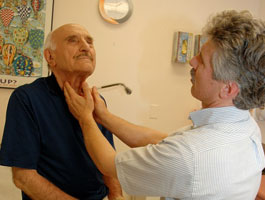Select language
Select language

The CareOregon Quality Management Committee (QMC) approves guidelines that are evidence-based and reviewed at least biennially by a nationally recognized body of experts on the topic. Once approved, these are placed on the website. Paper copies are also available upon request.
For more information on the guideline selection and approval process, see Clinical Guidelines Policy.
CareOregon-approved guidelines | |||
Topic | Additional resources | Source | Approved by CareOregon QMC |
| Tobacco cessation | See below | 2008 AHRQ | December 2023 |
| Childhood immunizations | See below | 2025 CDC | January 14, 2025 |
| Adult immunizations | See below | 2018 CDC | December 22, 2022 |
| Congestive heart failure (CHF) | See below | 2016 ACC/AHA/HFS | August 2023 |
| Diabetes (diagnosis and management of Type 2 diabetes in adults) | See below | 2025 ADA | September 2025 |
| Early childhood cavity prevention | See below | 2014 AAP | February 14, 2023 |
| Oral health care during pregnancy and through the lifespan | See below | ACOG | March 2025 |
| Attention Deficit Hyperactivity Disorder (ADHD) - AAFP | See below | 2016 AAFP | February 17, 2026 |
| Attention Deficit Hyperactivity Disorder (ADHD) - AHRQ | See below | 2024 AHRQ | February 17, 2026 |
| Asthma | See below | 2018 CDC/NHLBI | August 2025 |
| Adult preventive services | See below | 2017 USPSTF | October 2023 |
| Child/adolescent preventive services | See below | 2017 USPSTF | October 2023 |
| Substance abuse screening | See below | 2016 SAMHSA | December 2023 |
| Depression (ACP) | See below | 2015 ACP | November 2025 |
| Depression (VA/DoD) | See below | 2022 VA/DoD | November 2025 |
| Depression (USPSTF) | See below | 2023 USPSTF | November 2025 |
| Palliative care | 2021 JNCCN | May 2025 | |
| Table header is decorative | |||
|---|---|---|---|
The Centers for Disease Control and Prevention (CDC) says that more deaths are caused each year by tobacco use than from human immunodeficiency virus (HIV), illegal drug use, alcohol use, motor vehicle injuries, suicides and murders combined. Research confirms that secondhand smoke causes disease and premature death in children and adults who do not smoke.
Tobacco Use Screening and Brief Intervention
The following interventions should be part of every visit with a patient who has recently quit:
Encourage the patient to talk about problems or anticipated threats to remaining abstinent.
Pharmacotherapy
Pharmacotherapy is fully covered by CareOregon. CareOregon requires a physician’s prescription for all pharmacotherapy options. Nicotine replacement therapy (NRT) includes gum, patch, lozenges and inhalers. Bupropion SR (Zyban) and Chantix are covered. Chantix requires a written prescription and the member is encouraged to be enrolled in the Quit For Life® Tobacco Cessation Program.
Approved therapies are in the CareOregon Formulary on our website. Ask Oregon Tobacco Quit Line staff about dosages and contraindications for these pharmaceuticals. The toll-free number is 800-QUIT-NOW (800-784-8669).
Pharmacotherapy during pregnancy
CareOregon supports the clinical practice guideline developed by the U.S. Department of Health and Human Services Public Health Service (Treating Tobacco Use and Dependence, June 2008) about using nicotine replacement therapy and Bupropion during pregnancy. Search for “Bupropion” in the formulary.
Use the five A’s — brief interventions — with a pregnant patient. Urge the patient to enroll in an intensive behavioral counseling service, such as the Quit For Life® Program.
Consider pharmacotherapy if a patient is a heavy tobacco user and is unable to quit with counseling only, and the potential benefits and likelihood of quitting outweigh potential risks.
Strong evidence supports proactive telephone counseling, group counseling and individual counseling in tobacco cessation. Nicotine replacement therapy is most effective when used with structured behavioral counseling.
Counseling
Tobacco cessation services are covered by CareOregon for both OHP and CareOregon Medicare Advantage members. No referral is required to provide tobacco cessation treatment and counseling. Providers are encouraged to follow the five A’s model for treating tobacco use and dependence.
The free Oregon Tobacco Quit Line (800-QUIT-NOW) is the first referral for providers without an in-house program. Providers may ask about recommended dosing levels and contraindications for NRT. The Quit For Life® Program is a covered benefit limited to twice in a 12-month period. It offers telephone counseling and support.
If your patient wants to set a quit date, fax a referral form to the Quit Line. A counselor will contact the patient. Registered callers may call the Quit Line for free cessation counseling as needed.
Fax: 800-483-3114
Call: 800-QUIT-NOW (800-784-8669) or TTY 711
Website: Oregon Tobacco Quit Line
Spanish-speaking counselors: 877-2NO-FUME (877-266-3863)
Order patient information from the CareOregon Communications Department, 503-416-1741, or email materials@careoregon.org. To order a free copy of CareOregon’s stop smoking packet to be mailed to your patient, call Customer Service at 800-224-4840. Please provide the member’s name and mailing address (one per household).

CareOregon shares data with the Oregon ALERT Immunization Registry and encourages providers to use this database to obtain immunization records for patients they are seeing. This is the best source for immunizations given by multiple providers and at multiple locations. This registry helps ensure up-to-date information and accurate and timely immunizations.
For more information, please visit the website.
Website feedback
Help us improve our website
Having trouble finding what you’re looking for? Want to tell us about your website experience? Take our feedback survey and let us know!